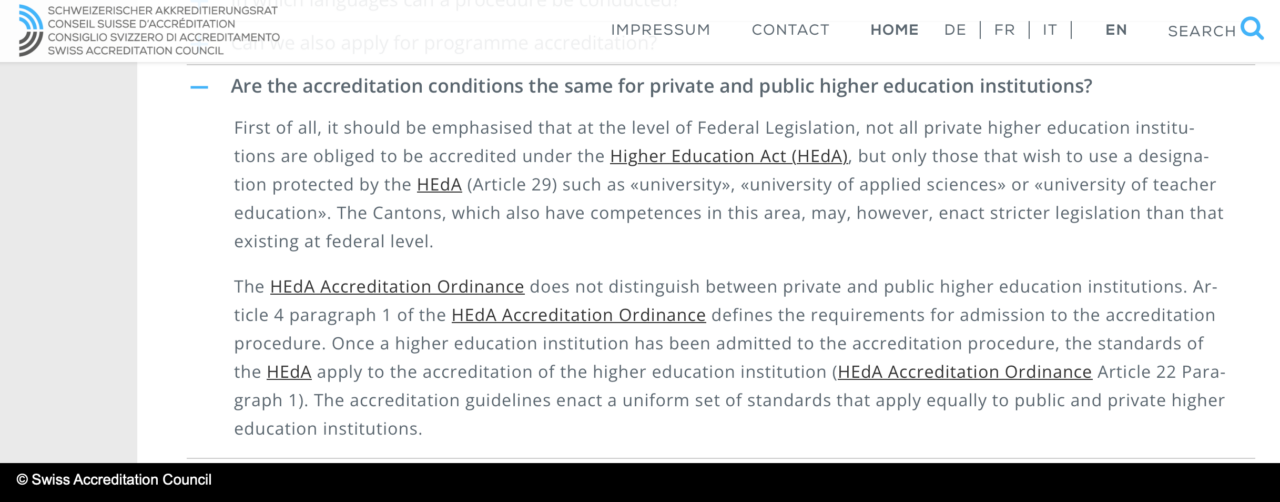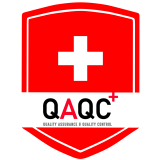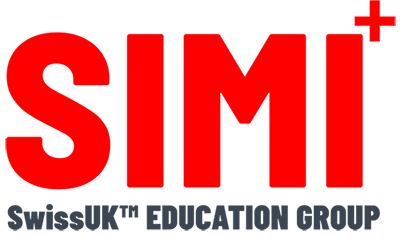ALL ACCREDITATIONA Future Within Fully Accredited Education
SIMI Swiss views quality assurance and quality control, and the pursuit of valuable education accreditation, not as marketing tools but as opportunities to enhance the quality of training and improve every activity and each lecture.
ACCREDITEDSIMI Swiss Current Accreditation
Swiss Truly International™ higher education institute is a core positioning of SIMI Swiss, affirming its role as an international HEI.
Moreover, SIMI Swiss never awards single degrees. All programs grant dual SwissUK™ qualifications: one representing the excellence of Swiss private education and the other recognized nationally through the UK Government system. With this unique advantage, students experience the world-class quality of Swiss education while benefiting from the global recognition of the UK’s prestigious academic framework.
INSTITUTIONAL LEVELASIC United Kingdom
PROGRAMATIC LEVELOTHM United Kingdom
PROGRAMATIC LEVELQUALIFI United Kingdom
ACCREDITATION & RECOGNITIONFrequently
Ask Questions
Although accreditation in Switzerland is optional and not mandatory, SIMI SWISS is the pioneering higher education institution with accreditation at both the programmatic and institutional levels:
- Accredited by the Accreditation Service for International Schools, Colleges and Universities (ASIC) at the highest level (Premier Institution); Read more [HERE]
- A full member of SVEB (Swiss Federation for Adult Learning); Read more [HERE]
- Accreditation of the management system compatible with the European Quality Assurance Framework for Vocational Education and Training (EQAVET) and Standards and Guidelines for Quality Assurance in the European Higher Education Area, awarded by the HEAD – Higher Education Accreditation Division; Read more [HERE]
- Achieve ISO 21001:2018, complying with the European Quality Assurance Framework for Vocational Education and Training (EQAVET) and the Quality Assurance in the Higher Education Area Requirements (EGS); Read more [HERE]
- Programs is recognized by Ofqual UK.Gov Awarding Bodies; OTHM Read more [HERE]; Qualifi Read more [HERE]
- Learning outcomes are mapped to the UK national occupational standards. Read more [HERE]
Reference:
- Guidelines of how to check the accreditation of SIMI Swiss: CLICK HERE
Accreditation is not directly related to the acceptance of graduates in the world of work. However, accreditation plays a greater role in admission to other national and international higher education institutions.
Source: Swiss Accreditation Council; extracted from the FAQ section, from the question, “What is the value of institutional accreditation for higher education graduates in terms of acceptance in the professional world and admission to other higher education institutions at national and international levels?” Read more here.

No, this conclusion cannot be drawn in this way.
Source: Swiss Accreditation Council; extracted from the FAQ section, from the question, “I want to study at an institution that is not institutionally accredited – should I assume that it is of poor quality?” Read more here.

In principle, yes, but the laws of the siting cantons must be observed, as the awarding of titles is the responsibility of the cantons. The right of a higher education institution to award titles is also not tied to accreditation.
Source: Swiss Accreditation Council; extracted from the FAQ section, from the question, “If a higher education institution is not accredited, can it still award diplomas?” Read more here.

Not all HEI in Switzerland have to accredited.
In Switzerland, a higher education institution must be accredited in accordance with the Higher Education Act (HEdA)(Article 29) if it wishes to use a protected name such as «university», «university of applied sciences» or «university of teacher education» in a national language or in another language. This also applies to versions derived from it, such as «tier-one colleges» or «UAS colleges». On the other hand, terms such as «higher education institute», «business school» or similar are not protected by federal law. On the other hand, it may be that cantonal law is more restrictive than federal law. In this case, the canton where the respective university is located can provide you with further information.
Source: Swiss Accreditation Council; extracted from the FAQ section, from the question, “Does every higher education institution in Switzerland have to be accredited?” Read more here.

Private higher education institutions that do not wish to make use of the right to use reserved designations under Article 29 of the Higher Education Act (HEdA) do not have to be accredited. However, according to Article 2 HEdA, all public higher education institutions – i.e., federal and cantonal higher education institutions – must be accredited.
Source: Swiss Accreditation Council; extracted from the FAQ section, from the question, “Why are not all higher education institutions in Switzerland accredited?” Read more here.

In Switzerland, the accreditation of study programmes is not mandatory. Within the framework of institutional accreditation, higher education institutions prove that their quality assurance system covers all areas, and thus also the study programmes. However, they are thereby not formally accredited as programmes.
Source: Swiss Accreditation Council; extracted from the FAQ section, from the question, “Does the accreditation of a higher education institution also mean that its study programmes are accredited?” Read more here.

First of all, it should be emphasised that at the level of Federal Legislation, not all private higher education institutions are obliged to be accredited under the Higher Education Act (HEdA), but only those that wish to use a designation protected by the HEdA (Article 29) such as «university», «university of applied sciences» or «university of teacher education». The Cantons, which also have competences in this area, may, however, enact stricter legislation than that existing at federal level.
The HEdA Accreditation Ordinance does not distinguish between private and public higher education institutions. Article 4 paragraph 1 of the HEdA Accreditation Ordinance defines the requirements for admission to the accreditation procedure. Once a higher education institution has been admitted to the accreditation procedure, the standards of the HEdA apply to the accreditation of the higher education institution (HEdA Accreditation Ordinance Article 22 Paragraph 1). The accreditation guidelines enact a uniform set of standards that apply equally to public and private higher education institutions.
Source: Swiss Accreditation Council; extracted from the FAQ section, from the question, “Are the accreditation conditions the same for private and public higher education institutions?” Read more here.

Although quality accreditation is not mandatory and does not apply in the case of SIMI Swiss, SIMI Swiss does not view accreditation as a marketing or image-building activity. Instead, SIMI Swiss sees accreditation as an opportunity for continuous quality improvement, helping students gain access to a world-class program.
View all of SIMI Swiss’s accreditations here.
SIMI Swiss aims to become a University of Applied Sciences in Switzerland, and this is an important step to help SIMI Swiss better control the quality, outcomes, and opportunities for continuous improvement.
See more about the plan to become a Swiss University of Applied Sciences with Federal status [HERE]
Multi Recognized
University Partners
Help learners save on tuition fees and maximize the value of their degrees through recognition by both SIMI Swiss and its university partners.
FEDERAL STATUSBecome Swiss University 2027

SIMI Swiss is actively preparing to seek accreditation from the Swiss Agency of Accreditation and Quality Assurance (AAQ), which is approved by the Swiss Accreditation Council (SAC), by 2027.

FEDERAL STATUSBecome Swiss University 2027
SIMI Swiss is actively preparing to seek accreditation from the Swiss Agency of Accreditation and Quality Assurance (AAQ), which is approved by the Swiss Accreditation Council (SAC), by 2027.


